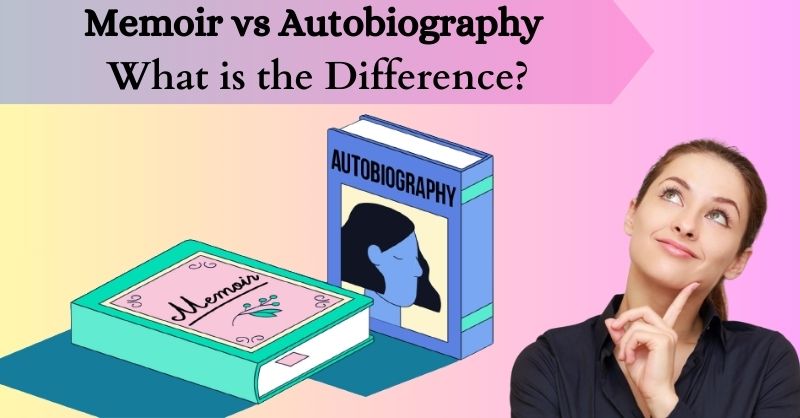Memoir vs. Autobiography: Two terms that often get thrown around in the world of literature and storytelling. They both involve an individual’s life story being recounted, mostly from a personal and emotional part.
But what sets them apart?
What are the autobiography and memoir writing tips?
Today, we’re diving into the nuances of memoirs and autobiographies to understand the key differences between memoir vs autobiography.
What is a Memoir vs Autobiography?
A memoir and an autobiography, though similar, differ in scope and focus. An autobiography spans the author’s entire life, presenting a chronological account of experiences and achievements. In contrast, a memoir zooms in on a specific period or theme, offering a more intimate, reflective narrative centered around particular events or insights.
The Scope of the Narrative:
Let’s Begin with the basics. A Memoir typically focuses on a specific period, theme, or aspect of the author’s life. It’s like a Polaroid picture of a specific time or event, providing a thorough and personal perspective. Autobiographies, on the other hand, aim to cover an individual’s entire life journey from birth to the point where the book was written. In conclusion, memoirs are more like zooming in on a specific chapter, while autobiographies are the whole book.
What is an Autobiography?
Autobiographies, vs memoirs, are written as an account of a person’s life, narrated by the individual themselves, in the first-person narrative. This narrative covers the individual’s entire life journey, from birth to early childhood to the present, or at least up to the point where the book was written. Autobiographies are nonfiction. The best tips to write an autobiography is to provide a comprehensive and factual record of the author’s life, experiences, and significant events.
Famous people frequently write autobiographies to give an in-depth account of their lives and to connect with their audience on a personal level. Examples of these people include politicians, actors, athletes, and historical figures. In addition, autobiography writing includes insight into the author’s personal and professional development and the historical and cultural backdrop of their times, autobiographies can be a useful source of historical and biographical information.
What is a Memoir?
A memoir is a written account of a specific time period, theme, or aspect of a person’s life. It then focuses on personal experiences, emotions, and reflections. Unlike an autobiography, a memoir zooms in on a particular slice of life, focusing on specific events, relationships, or themes that hold significance to the author.
They provide a unique and frequently introspective viewpoint on the selected time period or theme by delving deeply into the author’s thoughts, feelings, and views. The genre of Memoir is fundamentally subjective since memoirists use their own memories, feelings, and personal interpretations of events to tell their tale.
What is the Difference Between Memoir vs Autobiography
Scope:
Autobiography: The author’s whole life path, from birth to the present or a specific goal
Memoir: Concentrates on a particular time, subject, or element of the author’s life.
Comprehensiveness:
Autobiography: A thorough and objective description of the author’s life is intended
Memoir: Provides a focused, intimate, and emotionally deep analysis of a specific subject or time period.
Narrative form:
Autobiography: Keeps a more neutral and factual tone, emphasizing the presentation of events and information.
Memoir: Frequently includes the author’s feelings, thoughts, and personal interpretations, resulting in a highly emotional and subjective story.
Chronology:
Autobiography: Usually presents the author’s life in a linear, chronological order.
Memoir: Doesn’t always follow a chronological order and may skip about in time to accentuate a certain theme.
Authorship:
Autobiography: Are frequently written by famous people, historical individuals, and public personalities.
Memoir: Written by a wide spectrum of people, not just celebrities, allowing a variety of voices to be heard.
Purpose:
Autobiography: A detailed, historically accurate, and often written account of the author’s life.
Memoir: Aims to share personal observations, experiences, and feelings in relation to a theme or period of time, frequently in order to explore oneself or to impart life lessons.
Key Similarities: Autobiography vs. Memoir
Personal Viewpoint
Both autobiographies and memoirs are collections of personal stories that provide insights into the lives and experiences of the authors.
In the first person:
As the narrator in both genres, the author usually writes in the first person, which enables readers to identify with the author’s voice and point of view.
Reflection:
Both autobiographies and memoirs contain some of the author’s reflections. Insights, lessons learned, and feelings connected to the experiences and events recounted may be shared.
Nonfiction:
Both nonfiction genres, as opposed to fictional narrative, are based on actual events and experiences.
Human Experience
Both genres examine the human condition and provide readers a chance to identify with the author’s struggles and victories.
Storytelling:
Both times, authors utilize storytelling strategies to draw readers in and create believable, sympathetic narratives.
Impact on the heart:
Whether through the more comprehensive life experience in an autobiography or the introspective observations in a memoir, both genres have the capacity to elicit significant emotional reactions from readers.
What is their need:
Keeping Personal Histories Alive:
For the purpose of maintaining personal histories and cultural narratives, autobiography writing and memoir writing are crucial tools. They capture the unique opinions and experiences of people from various eras and cultures. These stories offer a first-person view of historical occurrences, cultural shifts, and human development. Literature makes sure that the memories and voices of people, whether renowned or ordinary, are not lost to time by recording these stories.
Compassion and Perception:
Literature, especially memoir writing, promotes understanding and empathy. The author’s struggles, victories, and frailties are experienced by the reader as they walk in their shoes. Readers can relate to a variety of life circumstances thanks to this emotional connection to the story, which promotes greater tolerance and compassion in society.
Motivation and Inspiration
A common theme in autobiography writing and memoir writing is how people overcome challenges to achieve success. Readers who are dealing with similar difficulties can get inspiration and encouragement from these stories. Literature inspires people to pursue their goals and overcome challenges by telling tales of resiliency, perseverance, and success.
Identity Exploration
In order to explore one’s own and one’s culture’s identity, memoirs, in particular, are quite important. In order to explore issues of self-discovery, belonging, and identity creation, authors draw on their personal experiences. These stories offer a forum for talking on racial, gendered, sexual, and ethnic diversity issues, promoting a better understanding of inclusion and diversity.
To Wrap It Up:
In conclusion, We reflect on our own identities in autobiographies and memoirs, which also provide important insights into the human condition, our common vulnerabilities, and our capacity for development. Their writings ring with universal truths that serve as a reminder of our interconnectedness and the collective wisdom ingrained in our existence. These stories provide a thorough examination of cultural variety and a record of societal changes that have impacted our planet.
Autobiography vs Memoir are the genres that are literary excursions that push the boundaries of storytelling and are more than just record-keepers. They contribute to the constantly changing literary world by fusing fact with artistic expression and bringing fresh perspectives and narrative techniques to it.
FAQs
1. How are memoirs and autobiographies similar?
Memoirs and autobiographies are similar as both recount personal stories and experiences from the author’s life, written in the first person. They reflect on the author’s life events, offer insights and lessons, and are nonfiction. Both genres aim to provide a deep understanding of the human experience and engage readers through storytelling.
2. How does a memoir differ from an autobiography?
A memoir focuses on specific events or periods in an author’s life, offering a personal and emotional perspective, whereas an autobiography covers the author’s entire life from birth to the present, providing a comprehensive and factual narrative. Memoirs delve deeply into particular themes or experiences, often non-linear and subjective, while autobiographies maintain a chronological and objective approach.
3. Why are memoirs more interesting than autobiographies?
Memoirs are often more interesting than autobiographies because they focus on specific, emotionally charged periods or themes in the author’s life, providing a deeper, more personal and introspective narrative that resonates with readers on a human level. This approach allows memoirs to explore personal experiences and reflections in a more engaging and relatable way compared to the broader, more factual scope of autobiographies.
4. What are the similarities between biography and memoir?
Biography and memoir both tell personal stories in the first person, offer insights and reflections, are nonfiction, explore human experiences, and use storytelling to engage readers emotionally.
5. What are the different types of autobiography memoir?
Autobiography covers an entire life story, while memoir focuses on specific moments or themes, offering personal insights and reflections.








 November 28, 2023
November 28, 2023














